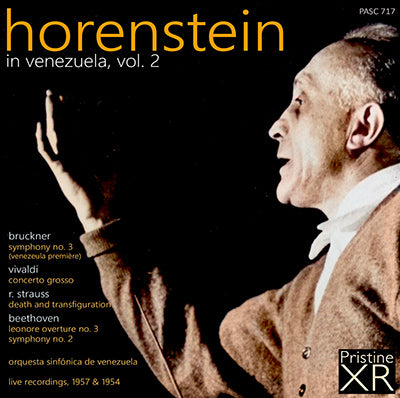
This album is included in the following sets:
This set contains the following albums:
- Producer's Note
- Full Track Listing
- Cover Art
Although Jascha Horenstein toured Latin America extensively starting in the
mid-1940s, he did not make it to Venezuela until his two debut concerts in
February 1954. He returned in May 1955 when he conducted the Venezuelan
premieres of Mahler’s First Symphony and Strauss’s Metamorphosen, and
appeared again in Caracas in January 1957 when he stayed for a full three
months. During this time, his last and longest stay, he conducted the local
premieres of Prokofiev’s Fifth Symphony (PASC 711), Bruckner’s Third,
Mahler’s Fourth and Schoenberg’s Verklaerte Nacht as well as six concerts
of contemporary music at the Second Latin American Music Festival. In all,
Horenstein led the OS Venezuela sixteen times and although all of those
concerts were recorded not all of them have survived. This collection
reproduces some that have, taken from his first and last visits to Caracas,
and includes his only known recording of Beethoven’s Second Symphony.
CD1: Bruckner entered Horenstein’s life at an early age when he attended a concert in Vienna of the Ninth Symphony conducted by Nikisch in 1912. He often referred to that occasion as a turning point in his life and admitted that whenever he conducted Bruckner he “could not avoid” doing things that he originally heard from Nikisch. During the early part of his career he conducted only the Ninth in public and although he also did a broadcast of the Sixth and recorded the Seventh for DG (PASC 203), he never included them in a concert until decades later. Following his Bruckner Ninth concert in Leningrad in 1932 and his exit from Germany a year later, Horenstein did not touch Bruckner again until he recorded the Ninth for Vox in 1953 (PASC 429).
The present recording of the Venezuelan premiere of Bruckner’s Third Symphony documents Horenstein’s first public performance of anything by Bruckner for 25 years as well as his first attempt at the Third, a work that quickly became one of his favourites. Presumably it was his idea to follow Bruckner with Vivaldi’s Concerto Grosso, an unusual but strangely satisfying choice and the only example of Horenstein in this repertoire. Eschewing the usual Vivaldi scramble, his comfortable tempi allow for some deeply satisfying sequences and provide the violin solo with opportunities for tasteful and refined portamento playing in the Largo fourth movement.
CD2: Vivaldi preceded Strauss’s Death and Transfiguration, a Horenstein favourite that ended this and many other evenings. It is one of at least five recordings of the work he made over the years and, at just over 22 minutes, is also one of the swiftest.
The Leonore III overture and Beethoven’s Second Symphony were recorded
three years earlier during Horenstein’s first trip to Venezuela in Feb.
1954. The hushed opening of the Leonore Overture generates a beguiling
sense of mystery, underlined by Horenstein’s trademark ability to make the
orchestra play really softly while maintaining intensity. This is also
notable in parts of the symphony, an energetic, vivacious, agile reading
that also leaves much space for lyricism and is his only recording of this
work.
One might justifiably ask what possible value or interest could there be in a series of rather average recordings with a third tier orchestra lacking the refinements of sound and execution expected by today’s listeners, in works of now standard repertoire that are available in dozens of better sounding, better played versions, including some conducted by Horenstein himself? The answer is that his views of all these works, especially when captured live as here, remain engaging and highly absorbing no matter when or with whom he performed them. His ability to inspire an orchestra he did not know well to cooperate creatively, with one mind and one heart and sometimes in music they did not know at all, is awe inspiring. There is a world-class feel to some of these performances that would make a good impression anywhere, and one readily forgives the mistakes and ragged execution, both musical and technical, when so much else is of such intense vitality and inspiration.
Misha Horenstein
HORENSTEIN in Venezuela Vol. 2
disc one (65:37)
BRUCKNER Symphony No. 3 in D minor, WAB 103
(1890, Schalk/Rättig edition) - Venezuela première
1. 1st mvt. - Mäßig bewegt (20:11)
2. 2nd mvt. - Adagio (etwas bewegt), quasi Andante (13:16)
3. 3rd mvt. - Scherzo: Ziemlich schnell (7:03)
4. 4th mvt. - Finale: Allegro (13:09)
VIVALDI Concerto Grosso in D minor, RV.565, Op. 3, No. 11
5. 1st mvt. - Allegro (1:20)
6. 2nd mvt. - Adagio e spiccato (0:32)
7. 3rd mvt. - Allegro (3:36)
8. 4th mvt. - Largo e spiccato (2:20)
9. 5th mvt. - Allegro (4:10)
disc two (71:05)
1. R. STRAUSS Death and Transfiguration (Tod und Verklärung), Op. 24 (22:49)
2. BEETHOVEN Leonore Overture No. 3, Op. 72b (13:54)
BEETHOVEN Symphony No. 2 in D major, Op. 36
3. 1st mvt. - Adagio molto - Allegro con brio (10:09)
4. 2nd mvt. - Larghetto (13:44)
5. 3rd mvt. - Scherzo. Allegro - Trio (3:55)
6. 4th mvt. - Allegro molto (6:34)
Orquesta Sinfónica de Venezuela
conducted by Jascha Horenstein
Concerts recorded at Teatro Municipal, Caracas, Venezuela
XR remastered by Andrew Rose
Artwork based on photograph of Jascha Horenstein
Very special thanks to Misha Horenstein for source recordings, artwork, notes and other assistance.
Bruckner, Vivaldi & Strauss: concert of 8 February, 1957. A stereo recording.
Beethoven: concert of 23 February 1954. A mono recording, presented in Ambient Stereo.
Total duration: 2hr 16:42

